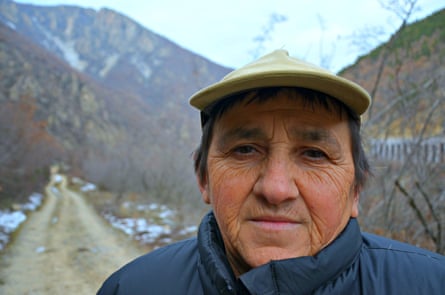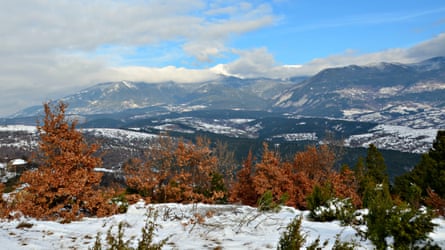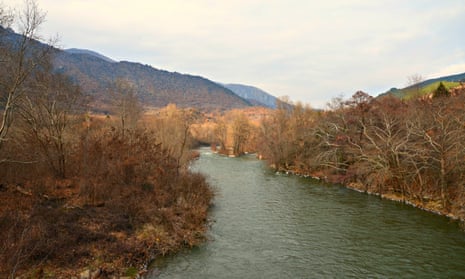Bulgaria is planning to carve a motorway to Greece through a spectacular gorge famed for its golden eagles, griffon vultures and peregrine falcons, in defiance of an EU order to tunnel the road.
The 11-mile Kresna valley is also a crucial migratory path for bears, wolves and jackals, with a warm micro-climate that bridges the southern fringe of the Balkans with the northern tip of the Mediterranean.
The project, which would link Germany to Greece, is thought so vital to tourism, trade and transport that the EU is offering €673m (£530m) of grants towards it between now and 2020.
But local people say it will bring “desertification” to their villages, sparking demographic upheaval in a region where young people are already upping sticks for countries such as the UK.

And conservationists fear that the road will devastate birds, bats, tortoises and large mammals, scarring the site with 11 bridges, 11 overpasses, seven dual tube tunnels, 59 mostly concrete fortification walls and 10 supported slopes.
“We stand to lose one of the most valuable wildlife conservation sites in Europe,” said Dimiter Vasiliv, who runs an eco-centre in Vlahi, Kresna. “If you even kick a stone here you’re likely to kill a reptile. It would be a disaster if we lost this place.”
Historically, Kresna has been a battleground for armies and an existing through road follows a Roman path and was constructed by the Nazis using Jewish and Communist prisoners for slave labour.
It is also a climatic and ecological battleground – between snow and sun, Greek juniper trees and Balkan pines. But in wildlife terms, the Kresna valley that rises dramatically above the Struma river is more like a menagerie.
“In one square kilometre of Kresna Gorge, there are 122 butterfly species,” said Stoyan Beshkov, an associate professor at Bulgaria’s National Museum of Natural History. “The whole of the UK has just 59 species by comparison.”
Another zoologist at the museum, Boyan Petrov, said that the gorge boasts more than 3,500 species of flora and fauna in total, including many snakes, turtles and bats found nowhere else in Europe.
The Bulgarian Society for the Protection of Birds says that a motorway would cause a tenfold increase in bird mortality. “It poses a particular threat to vultures which will eat carrion from animals killed on the road, and risk being killed themselves,” said Irina Kostadinova, the group’s EU officer.
Ironically, the EU has funded the rewilding of griffon vultures in Kresna and offered €1bn of grants for the motorway on the condition a long underground tunnel is constructed.

But senior Bulgarian officials have told the Guardian that they now see the tunnel route as “impossible” and are putting the finishing touches to an alternative environmental risks paper which will be launched within two months.
This study will say that tunnelling poses a grave environmental danger due to earthquake risks, high levels of underground uranium, soil disposal issues and the depletion of water tables.
So far, only one geological paper supporting the earthquakes assessment has been made public and officials privately admit that it contains errors.
Tunnel finance is widely acknowledged as a key consideration. “It is so expensive that we really don’t have the money to build it,” said Assen Antov, the chief executive of Bulgaria’s national company for strategic infrastructure projects (NCSIP).
“The gorge is the path of least resistance,” added Bulgaria’s regional development minister, Lilyana Pavlova. “There are mountains on all sides and it is extremely expensive and difficult to build motorways through these.”
This though is exactly what the 3,000 or so residents of the Kresna Valley say they want the government to do, for the sake of their health, agriculture and local economy.
“The Struma motorway would close down our commerce and lead to a demographic crisis,” said the local mayor, Nikolai Georgiev. “People will leave the region. It will become a municipality with dying functions and no people. It would be desertification.”
“If the motorway passes just above us, the whole town will be polluted by NOx [nitrogen oxide] emissions from the vehicles,” said Kiriol Petrov, a local pensioner. “The rain will wash the dirt on to us all.”
Vasil Vasilyev, a vineyard owner, said that his community was in despair. “I produce four tonnes of white Keratsuda grapes a year. The grape is very famous [in the wine business] and only produced in Kresna. But if the motorway comes through here, everything will be destroyed.”
Vasilyev’s son had already moved to London, he said, like 20% of Kresna’s young. Georgiev estimates that the figure will rise significantly if the motorway is built.
Spanning at least eight miles, a Kresna tunnel would be among the world’s longest and built across a geological fault that experienced an earthquake with a magnitude of 7.1 in 1904.
Antov argues that it would cost around €7m a year to service the tunnel, which might be shunned by drivers who could finish their journeys more quickly on the current pass. That road already claims four lives a year in roadside accidents.
The European commission says that a duty to protect unique ecosystems has to be balanced with the much-needed boost that a motorway could provide to industries such as tourism and road haulage.
“Some motorways are more important than others, and this one has a strategic importance because of this corridor from Germany through Bulgaria to Greece and on to Cyprus,” an EU official said. “It is the backbone of what we want to achieve with Bulgaria. It matters to us.”
“Turtles and birds also matter to us,” he added.
The EU’s birds and habitats directive forbids actions that would destroy animals or wildlife sanctuaries, and so do the bloc’s existing grant conditions. But commission officials will not yet comment on whether they think that the Kresna motorway plan does this.

Bulgaria says that officials in the bloc’s regional development wing are privately supportive. “We’ve seen them. They realise what the problems are with the tunnel and I don’t think anyone considers it realistic anymore,” Antov said.
Commission officials publicly insist that the costs of long term damage to the Kresna Gorge would outweigh the short term benefits of building a motorway across it.
But the decision will finally be political. “You have all those ex-ante conditions but the truth is that if someone pushes a variant there, you can adapt these rules and turn the coin both ways,” an EU source said. “You don’t want to preclude or exclude any [options].”
The motorway’s route has been controversial since it was first proposed in 1997. Within five years the standing committee of the Bern Convention, a legal treaty which protects natural heritage, had insisted that it be tunnelled under the gorge with the existing road demoted to a local causeway. A Bulgarian environmental impact assessment in 2008 agreed.
Rather than starting work on the tunnel though, the government began building the motorway towards the gorge from the north and from the south, in a pincer movement.
A 2012 letter to Bulgaria’s transport minister from the commission’s director general for regional policy, Jean-Marie Selyer, which the Guardian has seen, expressed dismay at the lack of safeguards.
It said: “Commission services have serious reservations about providing a commission approval to finance parts of the Motorway without having any legally binding assurance that the results of the Environmental Impacts Assessment and of the Habitats Appropriate Assessment will effectively be implemented, ie that the tunnel will be built.”
In 2014, as the two roads converged on Kresna, the Bulgarian chamber of construction companies (BCC) co-wrote a letter to the government asking for a new impact study. This was granted. When it reports in two months, government sources say that the paper will propose a variant of the route favoured by the BCC.
Georgiev described the organisation as “very, very powerful because it represents the country’s richest people and companies, which are in charge of all infrastructure projects”.
“You could say that it defines the politics of the country,” he said.
Ivan Boykov, executive director of BCC, who sat on his country’s environment committee as an MP, maintained that “we are not enemies of the environmentalists”.
Anti-road campaigners allege that the BCC’s real concern has been to win construction contracts for Bulgarian firms. The chamber denies this, accusing environmentalists of being in cahoots with foreign firms. But it accepts that no Bulgarian company is capable of building the tunnel.
The BCC was in “constant talks” with the Bulgarian government, Boykov said, adding: “We’re extremely satisfied with the communication that exists with them.”
But conservationists argue that the planned highway would cut into mountains, increasing the threat of landslides, disturb animals with the upheaval of industrial construction, and involve chopping down trees which line the Struma river, causing soil erosion and flooding.
More than that, they argue that the destruction of biodiversity there has a cost that is economically unquantifiable. “In the end, as humans without animals, we will die from loneliness of the soul,” Vasiliv said.

Comments (…)
Sign in or create your Guardian account to join the discussion